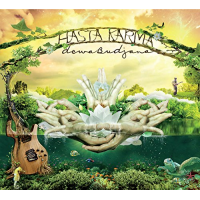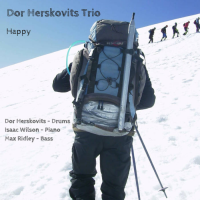Home » Jazz Articles » Album Review » Dewa Budjana: Hasta Karma
Dewa Budjana: Hasta Karma
Such lucidities give the music a certain tactility that separates Dewa from certain idols, and by which the melodic body of his writing moves and grooves. "Jayaprana" is another that finds Dewa in total control. Its second half gives Sanchez some room to roam, painting a streak of blue for each of Dewa's red, and between them a tender commercial break from Locke, whose feel for melody must be heard to be grasped.
"Ruang Dialisis" bears dedication to Dewa's his late father, alive but ailing at the time of this piece's composition. In addition to its narrative cohesion, samples of Dewa's grandmother singing a traditional funeral chant cross-hatch the grandson's resonant horizontals with a mature cultural fusion. Some Robin Guthrie-esque groundswells emphasize the emotional fragments hovering in ghostly overlay, culminating in gut-wrenching axe work. For playful contrast, "Just Kidung" ("kidung" means "song" in Indonesian) boasts the interlocking gymnastics of Williams and Lesmana, while "Payogan Rain" concludes in self-indulgent beauty. With a folksong quality that rides the edge of western harmony, the tune's acoustic guitar and melodica sing of the open road and a life lived to its fullest.
If jazz is about telling stories, then Dewa is an epic novelist, and his modest yet robust cast of characters eagerly awaits your attention to bring them to life.
Track Listing
Saniscara; Desember; Jayaprana; Ruang Dialisis; Just Kidung; Payogan Rain.
Personnel
Dewa Budjana
guitar, electricDewa Budjana: electric guitar, acoustic guitar; Joe Locke: vibraphone; Antonio Sanchez: drums; Ben Williams: upright bass; Indra Lesmana: piano, melodica; Jro Ktut: vocals.
Album information
Title: Hasta Karma | Year Released: 2016 | Record Label: Moonjune Records
Tags
PREVIOUS / NEXT
Support All About Jazz
 All About Jazz has been a pillar of jazz since 1995, championing it as an art form and, more importantly, supporting the musicians who make it. Our enduring commitment has made "AAJ" one of the most culturally important websites of its kind, read by hundreds of thousands of fans, musicians and industry figures every month.
All About Jazz has been a pillar of jazz since 1995, championing it as an art form and, more importantly, supporting the musicians who make it. Our enduring commitment has made "AAJ" one of the most culturally important websites of its kind, read by hundreds of thousands of fans, musicians and industry figures every month.






















